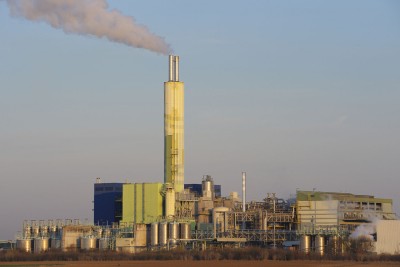
Recycling and re-use have many environmental benefits, including reducing the amount of waste we bury in already overcrowded landfills and burn in polluting incinerators, like the one pictured here. (Credit: iStock/Thinkstock)
Dear EarthTalk: Recycling can be a somewhat time-consuming task; so can you please provide some benefits of taking the time to separate my trash? -- Joseph Jiminez, Houston, TX
Recycling, which turns materials that would otherwise be incinerated or become landfill-clogging waste into valuable resources, has become second nature for many Americans. As many as four out of five U.S. households already take the time to separate recyclables from trash. Those hold-outs not yet willing to bother should consider the benefits to their household and society at large.
First and foremost for consumers is saving money. Many municipalities across the U.S. today don't charge customers for curb-side pickup of recyclables but continue to charge for garbage pick-up, so recycling is a way to reduce a household's overall waste expense. Otherwise, consumers who collect large amounts of recyclables may be able to find a local company willing to buy them in bulk. Some municipalities operate drop-off centers where consumers can trade in aluminum cans and other scrap metal (copper, steel, etc.) for cash. Yet another way to recycle and make some cash is to sell your old stuff in a yard sale. Likewise, shopping at yard sales and second-hand stores will also prevent the manufacture of new items altogether.
And there are many benefits to recycling beyond each household's own bottom line. Recycling saves resources. By recycling paper we save oxygen-providing, carbon-sequestering trees from the axe. By recycling plastic, we save petroleum, contributing (however slightly) to national security. By recycling metals, we take a bite out of energy-intensive mining. And recycling anything saves large amounts of energy and water that would otherwise be expended in making new goods from virgin materials. The U.S. Environmental Protection Agency (EPA) adds that recycling "protects and expands U.S. manufacturing jobs and increases U.S. competitiveness."
Yet another benefit of recycling is reducing the amount of waste we send to overcrowded landfills and polluting incinerators. At the other end of the consumer loop, buying products made out of recycled rather than virgin materials is another way to save money, as they are often less costly and just as good quality.
Beyond recycling, reducing our consumption of goods that are heavily packaged (often with materials not recyclable themselves) is another important part of any effort to spare bulging landfills and reduce greenhouse gas emissions. And the re-use of materials that would otherwise end up in landfills is yet another way to conserve resources. It's not difficult to think of many ways that used boxes, packaging, paper and plastic bags can be re-purposed to extend their usefulness and spare the garbage (or recycling) man. Also, composting food scraps-either at home or as part of a community effort-helps reduce the amount of waste sent to landfills and incinerators.
With world population still growing and developing countries now fully embracing an American-style consumer culture, recycling and other waste reduction techniques take on an increasingly important role in efforts to protect the environment. Indeed, there's no time like the present to step up reducing, re-using, recycling and composting. To find out where to recycle just about anything near you, visit the Earth911 website, where you can search by entering your zip code along with the item you're looking to unload.
CONTACTS: EPA, www.epa.gov/osw/conserve/rrr/recycle.htm; Earth911, www.Earth911.com.

Asthma rates have doubled since the 1980s, in spite of air quality in U.S. cities having increased over the same time period. This has led some experts to conclude that other factors—including Vitamin D deficiency, obesity, overuse of acetaminophen (i.e. Tylenol) and spray mist from glass cleaners and air fresheners—are now playing a role. (Credit: iStock/Thinkstock)
Dear EarthTalk: Is it true that asthma rates in the U.S. have doubled in the last three decades? What's behind this troubling trend and what can we do to reverse it? -- Patrick, via e-mail
Asthma is on the rise across the U.S., doubling since the 1980s. According to the Environmental Defense Fund (EDF), most people who develop asthma likely have a genetic predisposition but also probably experienced "critical environmental exposures during the first years of life." Asthma rates are highest in urban areas where auto and industrial emissions make for difficult breathing. But air quality in U.S. cities has improved in the last few decades, leaving researchers puzzled as to what's behind the trend.
One theory is that better hygiene in developed countries means that Westerners have less exposure to bacteria, viruses and parasites, altering our immune response with the result being increased risk for allergic diseases like asthma. Indeed, Western asthma rates are 50 times higher than in rural Africa. While this "hygiene hypothesis" may be part of the story, researchers believe that there are also other factors.
Some studies have shown a correlation between asthma and obesity, though a direct link is hard to prove. Other research has shown that psychological stress can trigger asthma attacks in those already predisposed. Dr. Harold Nelson, professor of medicine at the National Jewish Health in Denver, explained in a 2009 New York Times blog post that increased acetaminophen (i.e. Tylenol) use in young children, exposure to household cleaning sprays, and lack of Vitamin D also likely contribute to rising asthma rates. But how?
Pediatricians recommend against giving young children aspirin today, given the increased risk of Reye's syndrome, so many parents now use acetaminophen to relieve pain and reduce fever. But acetaminophen lowers levels of the antioxidant glutathione, resulting in an increased asthma risk. A 2008 study found that use of acetaminophen in the first year of life was associated with a 46 percent increase in the prevalence of asthma symptoms among a study group of 200,000 six- and seven-year-olds.
In regard to household cleaners, frequent inhaling of the spray mist from glass cleaners and air fresheners among other products irritates the lungs and increases the risk of developing asthma. A 2007 study found that European adults who used spray cleaners four days a week faced double the risk of developing asthma symptoms, while weekly use of cleaners increased the risk by 50 percent.
The link between Vitamin D deficiency and asthma comes from several studies on the topic over the last decade showing that low levels of Vitamin D in pregnant mothers result in more asthma in offspring. Those who spend lots of time indoors are particularly vulnerable to Vitamin D deficiency, as exposure to sunlight increases the body's ability to produce the important nutrient.
Dr. Nelson says that people can take steps to lower their exposure to these "new" asthma risk factors. For one, forego spray cleaners and air fresheners for liquids and pump sprays that don't produce a fine mist. Pregnant women might consider Vitamin D supplements. And parents should discuss pain relievers with their doctor and consider alternating different types so kids don't get overexposed to any particular one.
CONTACTS: EDF, www.edf.org/health/air/asthma; "New Risks Linked to Asthma Rise" (New York Times, 2/12/09), well.blogs.nytimes.com/2009/02/12/new-risk-factors-linked-to-asthma-rise.
Send your questions to: earthtalk@emagazine.com


